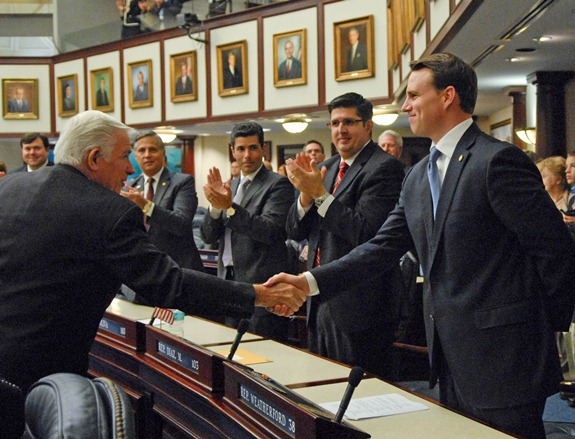
Leadership in the Florida Legislature is advancing ideas to reform the state’s campaign finance laws. Those ideas worry experts and advocates. (Photo courtesy of the Florida Legislature.)
By Ashley Lopez
Florida Center for Investigative Reporting
Leaders in the the Republican-led Florida Legislature are working to overhaul the state’s campaign finance laws. They are touting their effort as a step toward meaningful ethics reform. However, experts in campaign finance and voting rights advocates have said the effort won’t improve the fairness of elections — and might even make things worse.
So far, plans to improve campaign finance laws in Florida include raising the current contribution cap for candidates from $500 to $10,000, while also cutting out some state-level political groups.
Florida House Speaker Will Weatherford, R-Wesley Chapel, has said he is looking at some campaign finance changes proposed by Integrity Florida, an ethics watchdog in Tallahassee. Florida House and Senate leaders have said that cleaning up ethics laws in the state capital and fixing broken parts of Florida’s campaign finance system are going to be priorities this year.
The momentum followed a report outlining problems with campaign finance in Florida, with Integrity Florida taking particular issue with Committees of Continuous Existence, or CCEs, which collect campaign money while being uninhibited by contribution limits.
Because there is a tight limit on how much money businesses or political groups may give to state lawmakers, a lot of political money has been funneled through these CCEs. Furthermore, the state provides only a grainy picture of where this money is coming from and where it is going.
While members of groups such as the Florida League of Women Voters and the Brennan Center for Justice have said they support the idea of cracking down on CCEs, they have also said that raising the contribution limit would be disastrous.
According to experts during a conference call with the news media yesterday, the move would encourage legalized “bribery and extortion.”
The director of advocacy for the national chapter of the League of Women Voters, Lloyd Leonard, said it would be a step back for the state.
“We are very concerned Florida might go in this direction,” Leonard says. “We think it raises all the problems that we saw prior to Watergate. It raises the possibility of this legalized bribery. If individuals can give huge amounts of money, it gives the incumbent legislators the ability to go to those interests and say ‘well, if you want me to stand up for what you believe, I need a contribution.’”
J. Adam Skaggs, a lawyer with the Democracy Program at the Brennan Center for Justice at NYU’s Law School, said during the same call that the proposal is misguided.
“Blowing past the federal contributions limit would not only put Florida in the position of a real outlier among the other states, but would dis-incentivize participation and would further risk the perception among the public that politicians in Tallahassee and across the state are enthralled to deep-pocketed special interest groups,” Skaggs said.
Allen Cox, the former vice chairman of the Republican Party and the man who blew the whistle on former chairman Jim Greer for stealing campaign funds, has said the reform plans are also ignoring a part of campaign finance that causes the most trouble — state party funds.
While Weatherford and others want to increase transparency on donations to candidates and get rid of groups like CCEs, they are not cracking down on state parties at all.
The Tampa Bay Times/Miami Herald,
Absent from the bill, however, are any rules that would require the state’s two dominant political parties to disclose details of how they spend millions of dollars in contributions. Cox thinks that will encourage legislative leaders to continue to use their parties to finance dinners, travel and entertainment — and escape public scrutiny.
“If we really want to have sunshine for campaign finance reform, we should eliminate the massive loophole that allows the speaker and president to raise funds on behalf of the party, park them at the party and then dictate to the party how and where they will be spent,” Cox said. “This is the delicate issue that has been skirted for years and years and years and years.”
…
Under Florida law, political parties may accept unlimited sums from large donors and corporations, but may not earmark the money for either the House or Senate.
Weatherford and Senate President Don Gaetz, however, defend the party practices, as do other former speakers of the House.
The Florida House has already approved the reform bill in one of the three committees to which it was referred.
